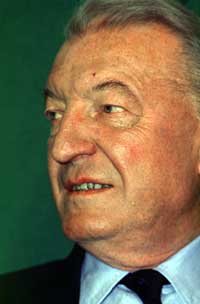14 July 2005 Edition
Haughey series was short on real politics
BY Mícheál MacDonncha

Charlie Haughey
It's part of the function of public service broadcasters to get people talking about politics, history and current affairs in their own country. To that extent the recent series on Charles Haughey on RTE succeeded with a big audience. But the biggest problem about the series was that, like Haughey himself, it saw politics as being solely about achieving and retaining governmental office.
That was the fundamental flaw in the series, not, as some have claimed, the fact that Haughey himself did not agree to be interviewed. While a Haughey interview would have been riveting, and would have ensured even higher ratings, it would not have changed the character of the series. It would not have given a deeper insight into the former Taoiseach and his times because the series focussed so narrowly on personalities and power play. It ignored the wider political, social and economic forces that were at work.
The most glaring example of this was in the last programme. The programme-makers accepted without question that the 'tough decisions' made by Haughey in the '87 to '89 government were correct. These were years of savage cutbacks that affected the poor most of all. Our health services are still trying to recover from the cuts in beds and other essentials imposed by Haughey's government, in which the Minister for Health, former GP, Rory O'Hanlon, earned the title Dr. Death. Emigration was back to 1950s levels. While the programme dealt effectively with the shafting of Brian Lenihan by Haughey, it did not mention that it was Lenihan who said, when challenged on emigration: "We can't all live on a small island."
Haughey's cynical use of verbal republicanism to further his career was not properly dealt with and there were only cursory glances Northwards. Footage of Brian Lenihan campaigning in the presidential election was shown and the impression was given that protestors around him were somehow related to the upheavals in Fianna Fáil. In fact they were anti-extradition campaigners protesting against the imminent handover of Dessie Ellis, on hunger-strike, on a stretcher, to the British by Haughey. His party had criticised both the Hillsborough Agreement and political extradition when in Opposition before implementing them in office. His plámás on Irish unity had deceived many and disillusioned many more when it was exposed.
Too much was made of Haughey's tentative role in the very early stages of the peace process. No mention was made of the fact that he presided over the renewal of Section 31 political censorship throughout his years in office.
The corruption of the Haughey era was seen in the series as the immorality of an individual. But where was the exploration of the political culture that made corruption possible and where was the mention of the real effect of the hand-in-glove relationship between Fianna Fáil governments and big business? It was not there. The results of all the corruption were not mentioned. These include the fact that Dublin is one of the most ill-planned, dysfunctional and socially divided cities in Europe.
The political and business elite in the 26 Counties now like to smile benignly on the ageing Haughey and, in their smugness, grant him some credit for his 'tough economic decisions' and ponder on the 'greatness' he might have enjoyed were he not so flawed. Meanwhile they preside over an economy with such greed and vanity that they make the Kinsealy squire look like one of Mother Theresa's nuns.


